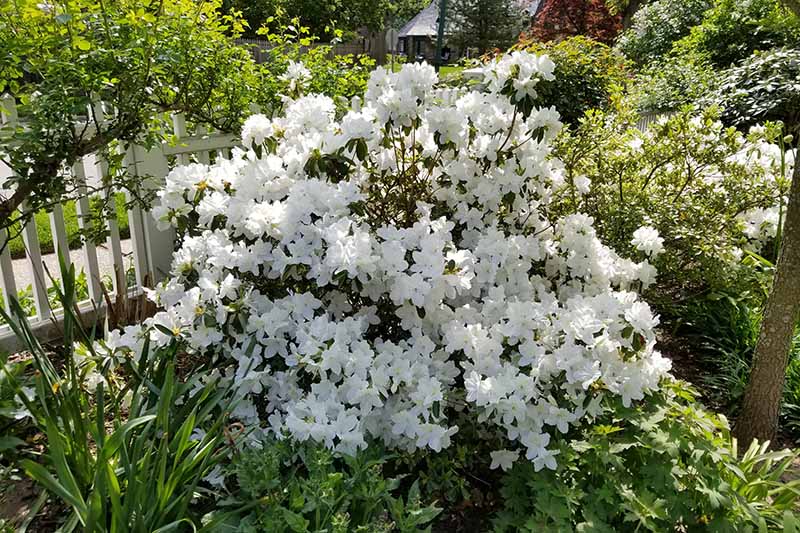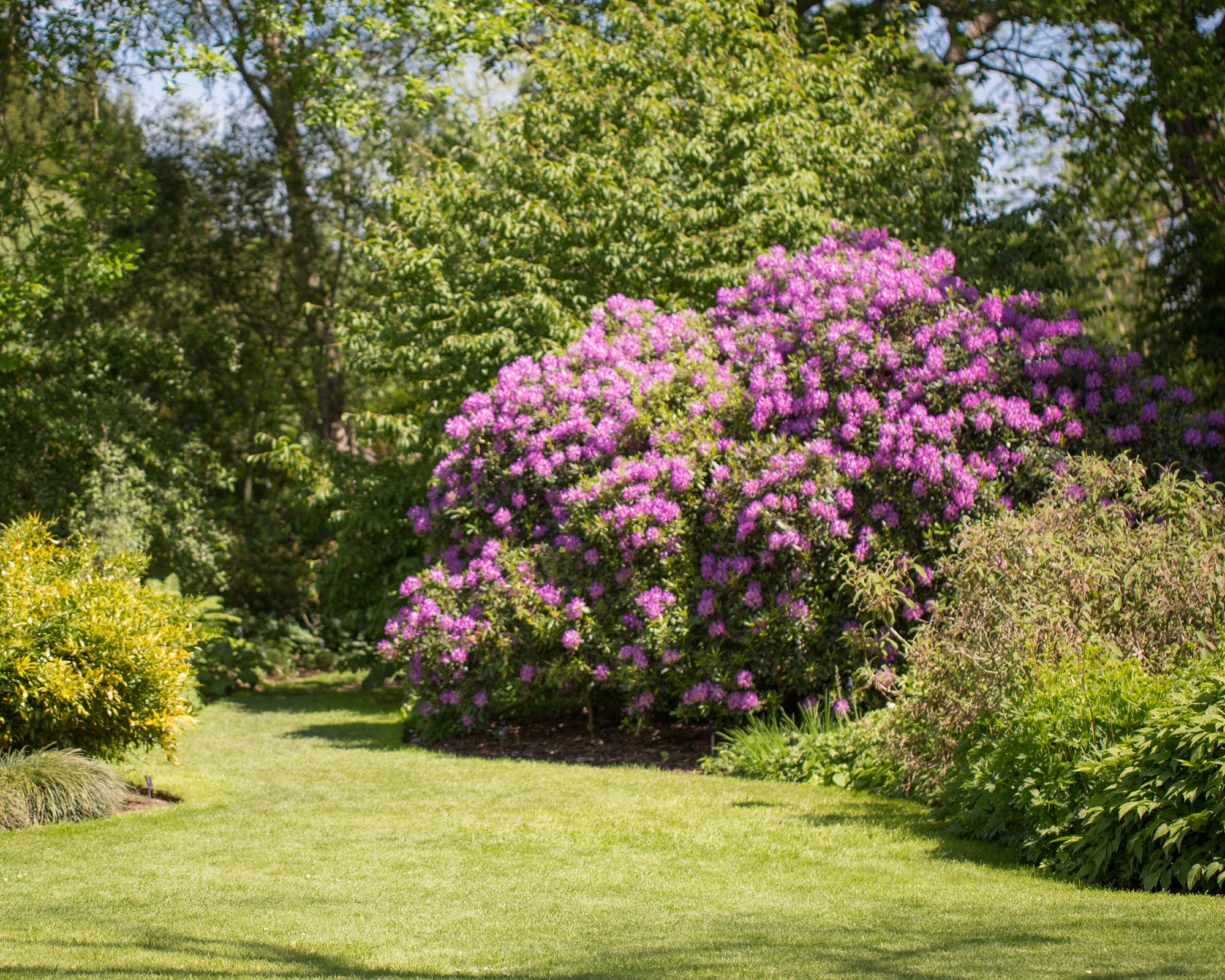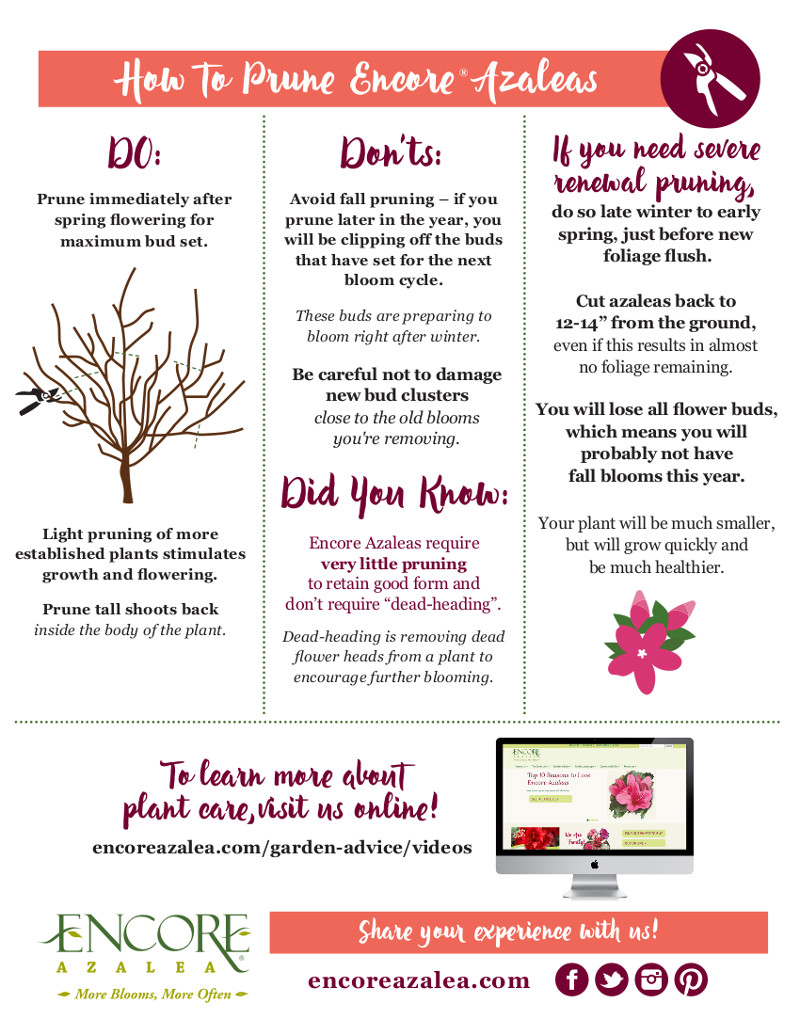The Best Time To Prune Azaleas In New England Moultonborough

When to Trim Bushes (AKA Shrubs) Timing, How Often, & More
Immediately after blooming is the best time to cut back or trim azaleas. Cutting back right after blooming gives the gardener a chance to get the dead blooms off of the plant and to shape up the shrub. If you wait and prune the azalea later in the year, there's a chance that you could prune off next year's blooms. Azaleas blooming in the.

The Best Time To Prune Azaleas In New England Moultonborough
Why prune azaleas. Dead, damaged, or diseased branches: Removing dead, damaged, or diseased branches can be done anytime. Dead branches should be cut back to a branch point that's alive. This is so that dormant buds can send out new growth. Damaged or broken branches should be cut back to just above a dormant bud for the same reason.

Vibrant azaleas didn't make the cut this year at the Masters
Cut about 1/3 of the largest scraggly azalea branches to within 6 to12 inches of the ground in early spring. Repeat for another two years. By the end of the three years all of the old wood will be removed and the azalea will have healthy new growth. (Image credit: Getty Images)

Pruning and Care for Azaleas and Rhododendron Merrifield Garden Center
The best time to prune azaleas is right after they finish blooming. This is usually in late spring or early summer. Pruning them at this time allows them to recover and grow new growth before the next blooming season. It's important to avoid pruning them too late in the season, as this can result in removing next year's flower buds.

How To Grow And Care For Azaleas Bunnings Australia
Remove two or three of the tallest branches, taking care to cut back to a side branch which is heading in the desired direction. Cut close to a side branch, as stubs tend to die back to the side branch and leave dead wood which may become infected later. If you remove a lot of the branches, it is a good idea to mulch around the plant to make up.

Deciduous Azaleas
Pruning to Control Size. Step 1: If you have a too-big azalea you want to save, go ahead and chop it down with loppers. Just don't take it all the way down; stop at about 1 foot off the ground. Step 2: After pruning, feed the azalea with a slow-release, water-soluble fertilizer (12-6-6).

How to Grow and Care for Azalea Bushes Gardener’s Path
Evergreen azaleas do well in partial shade with some wind protection. Deciduous varieties flower more profusely in full sun. Provide well-drained, humus-rich soil that is slightly acidic (pH 4.5-6). Mulch well. Shallow-rooted, azaleas tend to dry out quickly if not mulched. A mulch of oak leaf mold, pine needles, or aged oak, pine, or hemlock.

Pruning and Care for Azaleas and Rhododendron Merrifield Garden Center
When pruning azaleas, you don't need to worry about cutting back to a connecting branch. Azaleas will grow new branches from right below wherever you cut. Pruning to Rejuvenate. If you are pruning an azalea in order to rejuvenate the plant because it's become spindly or sparse, locate three to five of the largest branches on the azalea bush.

Ask the Gardener When can I cut back my azaleas? Humble, TX Patch
How to Prune Azaleas. Most azaleas are just going to need a little shaping and thinning, to maintain size and health. This is easy as 1-2-3, and why azaleas and rhododendrons are considered low maintenance. Step 1 - wait until the flowers die off in the spring to prune. Step 2 - cut off dead branches and stems from the shrub.

When to prune Azaleas and Crepe Myrtles
5. Prune new shoots when they reach 3 inches in length. Generally speaking, you should begin pruning your azaleas when new shoots reach about three inches long.'t wait much longer than this, however, as it can cause the plant to become weak and unsightly. 6. Snip off damaged leaves with sharp pruning shears.

How to prune azaleas to keep them healthy and beautiful Homes & Gardens
The second approach is slightly more measured, although it follows the same principle. In late winter or early spring, cut one-third of the branches of the azalea back to 6 to 12 inches. The following year, cut another third of the old growth down to the same height and repeat the next year. So, you are spreading out the process over three seasons.

Time To Prune Your Old Azaleas Homestead Gardens, Inc.
To prune azaleas, follow these steps: Cut individual branches with sharp pruning spears or hand pruners. Remove any branches that have outgrown the shape of the plant you want to make. Cut the branches off and place them in a natural location so they can sprout in a lovely shape. Remove any dead, damaged, or crossing shoots, including damaged.

Shaping Japanese azaleas Bonsai Empire
Unlike shrubs that can be cut way back each year, Curtis says azaleas should be cut back a few branches at a time. "To fully rejuvenate older azaleas, cut one or two large branches back to between six inches or a foot from the ground per year." she says. "As the new growth develops from the base, keep removing the larger, older stems.

Flowering Shrubs for Cut Flowers Oakridge Garden Centre
Use loppers or a hand saw if necessary to cut back the individual branches. Aim for a rounded shape on top. above the ground and cut the remaining branches to about 2 feet (0.61 m) in length. 3. Fertilize the azalea. Use slow release fertilizer labeled 12-6-6 to keep the plant healthy while it restores itself.

Pruning Azaleas Plant Addicts
Here are some general guidelines for pruning azalea shrubs: The best time is late winter/early spring. Yes, you will definitely lose some buds that formed last fall. But it is the healthiest time of year for the shrub to get cut, especially if you have to do a drastic pruning. You might think right after blooming would be the best time, but.

How To Care For Azaleas Planting, Pruning & More PlantingTree
Azaleas need at least four hours of sunlight daily and afternoon shade in places with scorching summers. Keep their soil moist, acidic, and fertile for them to grow well. Azaleas shrubs are best planted in the spring or early fall. Growth rates vary by species, but most are relatively slow-growing.